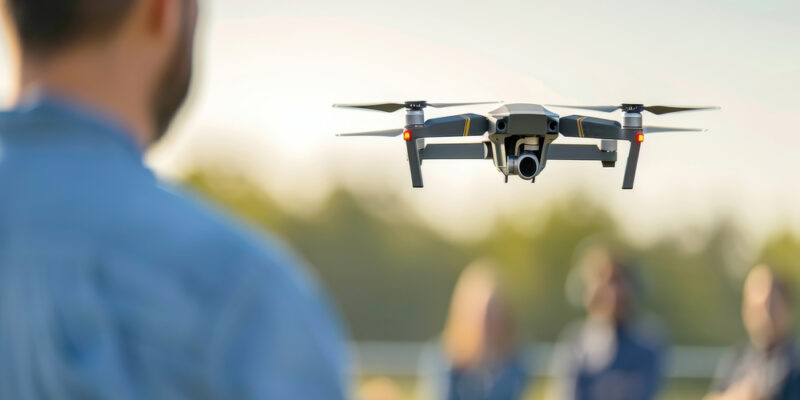Drones are now more than just expensive toys. These flying machines now inspect power lines, create building site maps, and take spectacular pictures of real estate. New jobs for drone operators pay well. Certification opens doors to this exciting field.
The Money Behind Flying Drones
Skilled drone operators demand astonishing hourly fees. Beginner operators often make $50-$75 hourly. Skilled pilots earn $150-$200 per hour. Some pilots involved in intricate industrial inspections can earn even higher salaries. These rates surpass many conventional jobs that necessitate years of schooling.
Real estate photography is merely the surface of the earning potential. Roof inspectors utilize drones to examine for damage without ascending perilous ladders. Farmers enlist pilots to oversee the health of crops in extensive fields. Aerial footage is necessary for films and advertisements. Construction firms monitor project advancement via weekly drone flights. Insurance adjusters evaluate storm damage more quickly by utilizing aerial perspectives. Every sector provides various salary ranges and chances for advancement.
Many certified pilots are attracted to the freelance path. Having the ability to create your own timetable and select clients offers a level of flexibility that traditional employment cannot provide. Some pilots operate solely on weekends and continue to generate significant additional earnings. Others establish full-time enterprises with many contracts and consistent income sources.
Getting Certified the Right Way
Commercial drone operators must have a Part 107 certification. This is according to the FAA. This certification separates hobbyists from paid professionals, and the exam covers airspace, weather, and safety. Exam preparation typically takes 20-30 hours.
The folk at ProTrain say that drone certification training comes in various formats. This is to fit different learning styles. Online classes offer flexibility and self-directed learning. Meanwhile, in-person classes give practical experience and feedback. Study aids help reinforce key ideas.
A passing score requires you to answer a minimum of forty-two questions correctly out of sixty. Some topics are aviation charts, weather reports, and emergency protocols. While the test might seem hard, many people pass each month. Success or failure hinges on how well you prepare.
Building Skills That Pay
Certification opens doors for pilots, but specialized skills greatly enhance their earning potential. Thermal imaging for inspecting solar panels demands high fees. Photogrammetry expertise enables the production of intricate 3D maps for surveyors. Acquiring video editing skills allows pilots to provide clients with refined end results.
Understanding the industry is as important as flying skills. Grasping construction processes aids pilots in taking valuable progress photographs. Understanding agricultural trends enhances crop observation services. Using the client’s language fosters trust and results in ongoing business. Intelligent pilots dedicate time to understanding their chosen sectors beyond mere flying skills.
Marketing abilities influence the amount of work pilots receive. Developing an outstanding portfolio highlights skills to prospective clients. Connecting at industry events creates important relationships. Business websites and social media visibility draw in clients looking for drone services. Financial success often relies more on business skills than flying skills.
Avoiding Common Mistakes
Unlicensed flights attract those seeking quick money. This dangerous action may lead to substantial penalties amounting to thousands of dollars. Insurance providers will not reimburse incidents involving unlicensed pilots. Clients are requesting certification proof more frequently prior to hiring operators. Cutting corners will, in the long run, cost more than doing things properly.
Conclusion
Drone certification turns an enjoyable pastime into a real professional opportunity. By investing in training and testing, you can boost your earning potential. You can also gain greater professional credibility. The demand for licensed pilots is only growing as drones become more widely used in different fields. Today’s start prepares operators for tomorrow’s market.











